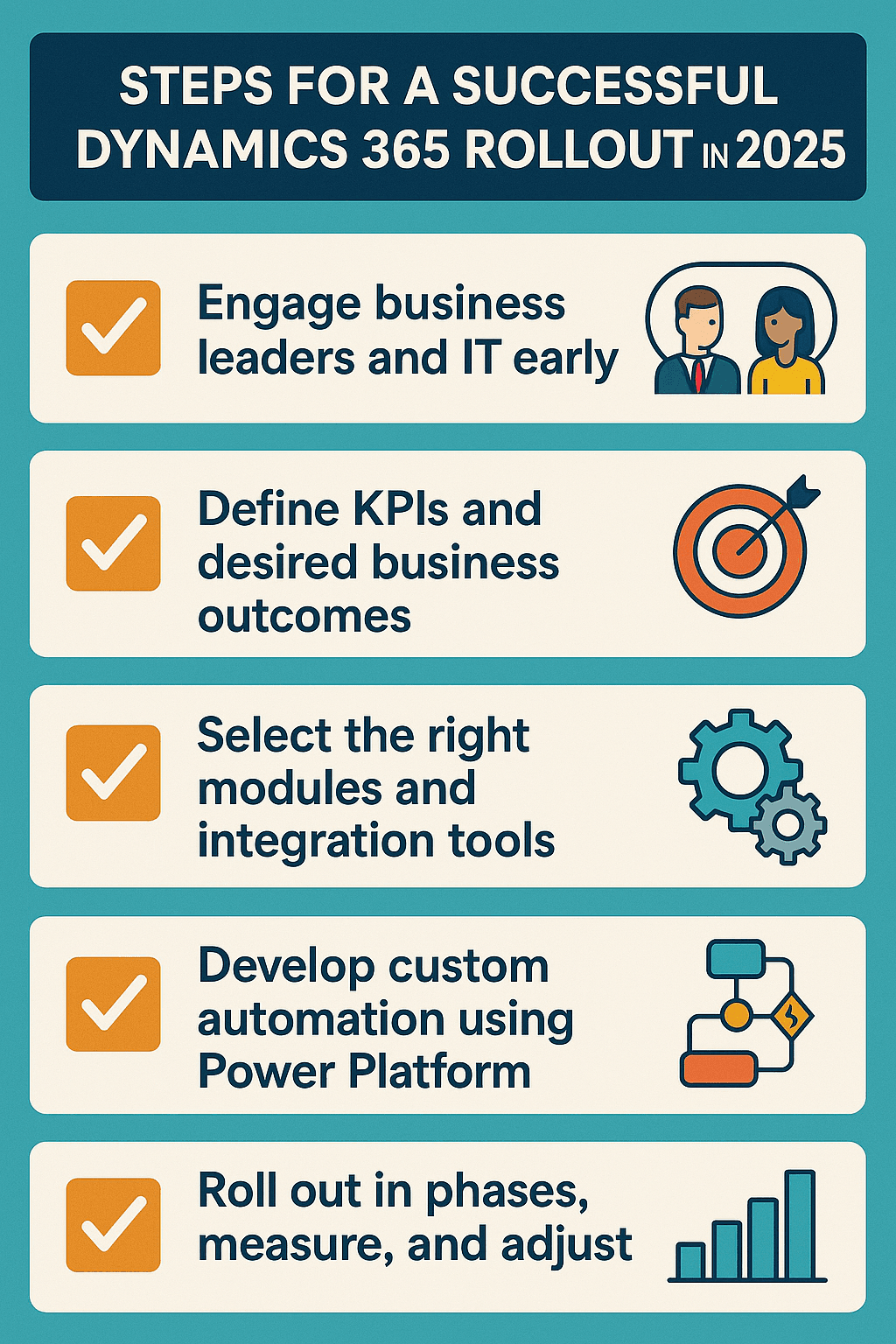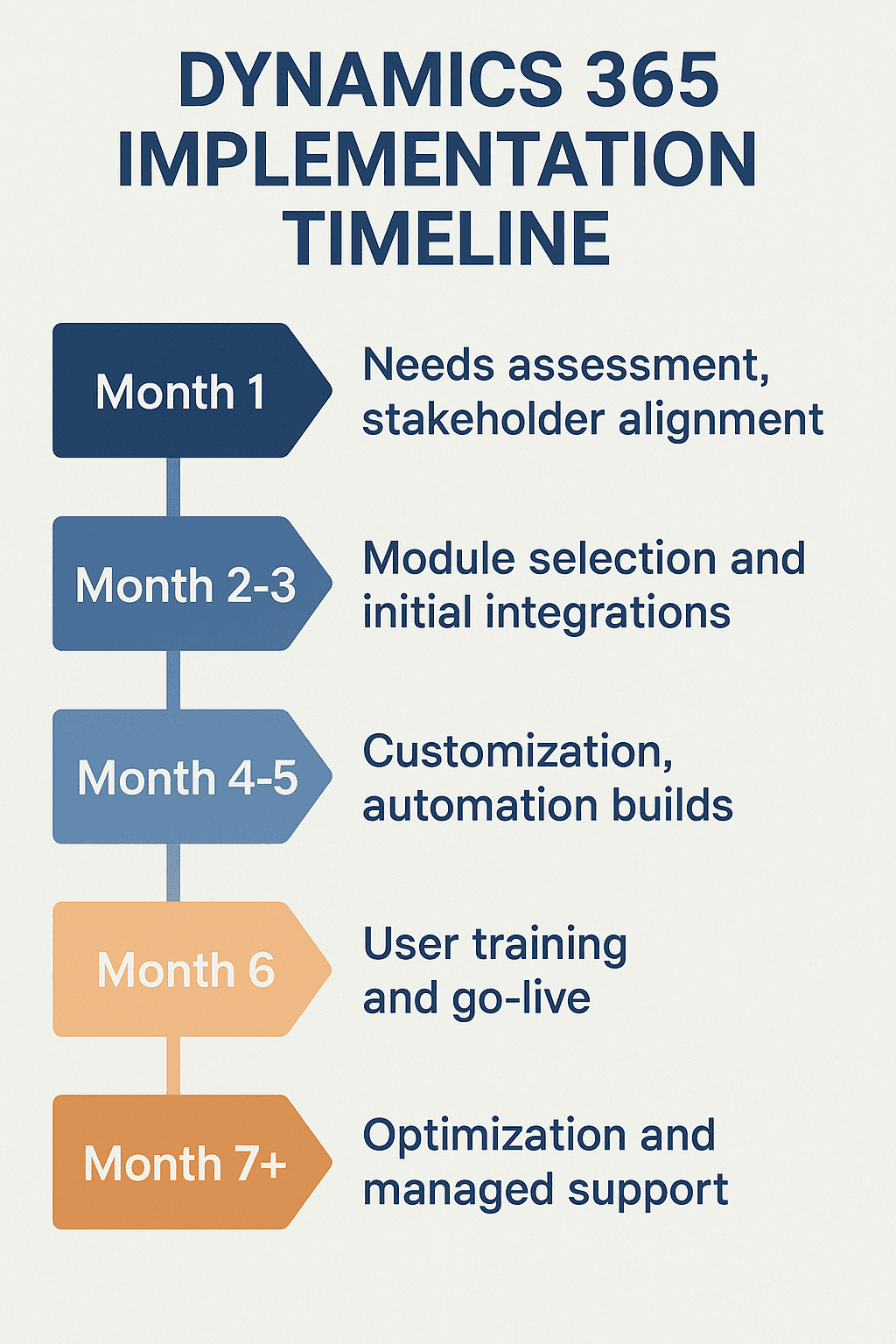Exploring Microsoft Dynamics 365 Modules: What You Need to Know in 2025
November 03
CRM Configuration
Blogs

Microsoft Dynamics 365 has cemented its status as one of the premier enterprise platforms for organizations seeking a unified approach to managing sales, service, finance, operations, and beyond. As we move further into 2025, understanding the core modules and how they can be leveraged for business transformation is essential especially for CRM administrators, IT decision-makers, and leaders invested in managed services and automation.
Understanding the Dynamics 365 Platform: A Quick Overview
Dynamics 365 combines CRM and ERP capabilities into an interconnected platform hosted on the Microsoft cloud. The advantage is clear: modular flexibility allows organizations to mix and match business applications tailored to their unique goals. Each module whether Sales, Customer Service, Finance, or AI-driven Insights offers specialized functionality designed for seamless integration and optimization.
Key Challenges Businesses Face In 2025
- Fragmented Data: Siloed customer and operational data hamper decision-making and automation.
- Scaling Customization: As companies grow, so do configuration and integration complexities.
- Rapidly Changing Market Demands: The need for adaptive platforms and automated processes is at an all-time high.
- Security & Compliance: Stringent regulatory requirements highlight the importance of enterprise-grade controls.
At OMI, we’ve found that the right Dynamics 365 modules, paired with thoughtful managed services and robust integration strategies, can directly address these challenges.
Core Microsoft Dynamics 365 Modules in 2025
Dynamics 365’s modularity means businesses don’t have to purchase a giant monolithic suite. Instead, they can select solutions for specific needs. Here’s a deep dive into core modules:
Key Dynamics 365 Modules and Primary Business Impact
Sales: Opportunity management, forecasting, AI-driven insights. Who benefits: Sales teams, CRM admins.
Customer Service: Case management, omnichannel support, SLA tracking. Who benefits: Service reps, operations.
Field Service: Work order automation, scheduling, mobile workforce management. Who benefits: Field ops, service leaders.
Marketing: Campaign automation, segmentation, analytics. Who benefits: Marketing teams, digital strategists.
Finance: Invoicing, budgeting, compliance, analytics. Who benefits: CFOs, finance admins.
Supply Chain Management: Inventory, procurement, logistics. Who benefits: Ops, logistics managers.
Project Operations: Project planning, resource management, time/billing. Who benefits: Project managers, finance.
Commerce: Retail POS, eCommerce, unified shopping experience. Who benefits: Retail ops, eCommerce leaders.
Human Resources: Talent management, benefits, compliance. Who benefits: HR teams.
AI & Insights: Predictive analytics, customer insights, process automation. Who benefits: Decision-makers, BI teams.
How Each Module Supports Transformation in 2025
1. Dynamics 365 Sales: Empowering Relationship Management
Dynamics 365 Sales is no longer just a tool for tracking leads—today, it leverages AI-driven analytics for opportunity scoring, forecasting, and coaching. In our experience, custom integrations are essential, bringing together rich customer data from other platforms for holistic visibility. This module supports a proactive sales culture and can be extended with marketing automation platforms or 3rd-party connectors for enhanced funnel management.
- Automated pipeline management and forecasting
- Guided selling with real-time insights
- Seamless integration into Microsoft Teams for faster collaboration
2. Customer Service: Delivering Connected Support
The module allows organizations to provide support across channels email, phone, chat, social, with workflow automation and robust SLA tracking. By integrating with knowledge bases and AI-driven self-service, teams can resolve issues faster and create lasting customer loyalty. Custom analytics dashboards can illuminate bottlenecks, helping admins continuously refine processes.
- Omnichannel engagement (email, chat, social, etc.)
- Automated case routing and escalation
- AI-recommended responses and knowledge management
3. Field Service: Optimizing Mobile Workforces
Mobile workforce management has grown crucial for service-driven companies. With Field Service, businesses can schedule resources, dispatch technicians, and manage work orders with built-in asset tracking. IoT integration unlocks predictive maintenance, which reduces downtime and costs. For organizations managing distributed teams, our experts can help configure real-time mobile integration and reporting.
- Pooled resource scheduling and automated work orders
- Live GPS tracking and asset visibility
- Remote assistance features leveraging AR (in advanced deployments)
4. Finance & Supply Chain: Unifying Operations & Compliance
Dynamics 365 Finance centralizes accounting, budgeting, compliance, and cash flow analysis, while Supply Chain Management streamlines logistics, procurement, and order fulfillment. Together, these modules provide a single source of truth from procurement to payment. By integrating with external ERP and analytics platforms, companies achieve comprehensive oversight and compliance.
- Automated financial reporting and workflows
- Real-time inventory management across locations
- Risk assessment and compliance dashboards
5. Marketing: Personalized Campaign Automation
The Marketing module enables campaign orchestration, lead scoring, and advanced segmentation empowering teams to run targeted programs and track ROI. Integration with Sales and Customer Service ensures data consistency for end-to-end customer journeys. Our managed services approach supports custom campaign builds, data cleansing, and real-time analytics dashboards, boosting marketing efficiency.
- Intuitive journey builder for email, SMS, and events
- Seamless integration with Dynamics 365 Sales
- Detailed campaign analytics and performance visualization
6. AI, Analytics, and Power Platform: Driving Intelligence
AI-driven Dynamics 365 Insights modules surface predictive recommendations for sales, service, finance, and HR. The Power Platform encompassing Power BI, Power Apps, and Power Automate, enables custom reporting, low-code automation, and process enhancements. Teams can build their own dashboards or automate workflows without heavy IT involvement, accelerating digital transformation through empowered citizen developers.
- Real-time analytics and KPI visualization
- Custom process automation with minimal code
- Plug-and-play connectors for rapid integrations
Dynamics 365 Integration Ecosystem
- CRM/ERP Core: Sales, Marketing, Customer Service, Finance, Supply Chain
- Connected Apps: Power BI, Power Apps, Power Automate
- AI/Analytics: Customer Insights, Sales Insights, Customer Service Insights
- Native Integrations: Microsoft Teams, Outlook, Azure
Best Practices for Maximizing Module Impact
From our experience supporting businesses across industries, successful Dynamics 365 transformation projects adhere to these best practices:
- Conduct a needs assessment: Map current pain points and processes to Dynamics 365 module capabilities before implementation.
- Emphasize integration: Use connectors and APIs to bring external data into Dynamics modules for consolidated analytics and automation.
- Invest in managed services: Delegate administration, updates, and custom enhancements—freeing your team to focus on business value.
- Leverage user training: Ensure teams receive ongoing education to maximize adoption of new module features and workflows.
- Monitor and optimize: Use dashboards to measure module impact, then iterate on configurations for continuous improvement.

Industry Trends & the Future of Dynamics 365
2025 marks a year of real-time AI, advanced automation, and industry-specific cloud solutions. According to recent research from Microsoft, low-code tools and integrated intelligence are accelerating return on investment for organizations deploying enterprise CRM and ERP platforms. For business leaders looking to future-proof their operations, investing in both modular capabilities and managed services is non-negotiable.
Thought leadership from Harvard Business Review suggests that organizations able to rapidly adapt their digital core (including CRM/ERP systems) are better positioned to outpace competitors in a volatile market.

Conclusion: Setting Up for Success with Dynamics 365
Understanding and maximizing Dynamics 365 modules in 2025 goes well beyond out-of-the-box features. For organizations serious about customer engagement, data-driven decision making, and operational agility, the combination of the right modules, robust integrations, and reliable managed services will be transformative.
If you’re considering a new Dynamics 365 rollout or optimizing your current deployment, experienced partners like OMI can guide the process from assessment through to ongoing support. Connect with us here to discover how our decades of expertise in CRM, managed services, and AI-powered automation can drive your next wave of digital transformation.